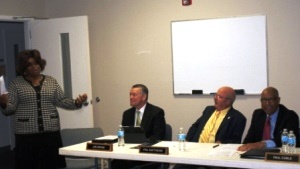Non-profit leaders in Southeastern Wake County told County Commissioners transportation is a real barrier for low-income families in need of social services either from the county or private non-profits.
On Tuesday, November 19, Commissioners and Interim County Manager, Joe Durham, as part of their scheduled “Listening Tour,” provided detailed information about county programs and services as well as State-based services the county implements. The meeting was held at First Baptist Church in Knightdale.
Community activist and Raleigh resident, Octavia Rainey, helped moderate the evenings’ talk.
“The conversation about transportation is around the needy versus the have’s,” said Rainey, arguing that park and ride is not the best answer. “If you can’t park it, you can’t ride it. We need busses in our neighborhood, not at the shopping center,” said Rainey, adding that as a bus rider, she speaks from experience.
Transitional housing, for example, is very dependent on local transportation, as are after school children’s programs.
Amelia Dewberry, formerly of the non-profit Right Choice Program, which provided after school safe haven for at-risk youth, had its funding completely eliminated more than a year ago. That resulted in elementary school kids to walk across a dangerous overpass alone, on their way to the nearby Boys & Girls Club.
Dewberry said that by adding more transportation options in the area, parents will have easier to access to pick up kids from after school programs.
Problems Persist, Solutions on the Horizon
“We know there is uncertainty on the state, federal and local level in terms of services. We need to find a better strategy to help those in need,” said Commissioner Joe Bryan in his opening statement. With 970,000 people in Wake County, the area is facing a 12% poverty rate.
“That’s a significant amount of people,” said Bryan, adding that the session helps put a face to those in need.
Durham acknowledged the county needs to provide better access and better customer service. “Recently,” he said, “That hasn’t worked out so well.”
Residents in need have been showing up at the County building as early as 4:00 am, hours before the building opens, in an effort to be among the first come, first served in the distribution of benefits like Energy Assistance.
“We are doing everything we can to get better,” Durham said. The County is adding more temporary personnel, making sign up available online and making investments in local non-profits to help better distribute benefits. Durham also encouraged spreading the word that other regional centers, like the one on Swinburn Avenue, are open to assist residents.
There is a backlog of applications for services like SNAP benefits, about 60-90 days; Durham said they are moving closer to a 60 day backlog, but are diligently trying to speed up the process in an effort to help citizens fall off the rolls of social services and begin the “Execution of their life plan.”
Other concerns like support for local entrepreneurs and job matching programs were raised. City officials recognized senior staff who shared their direct phone numbers where specific solutions can be shared.
Editor/Staff Writer: Brenda Porter-Rockwell




